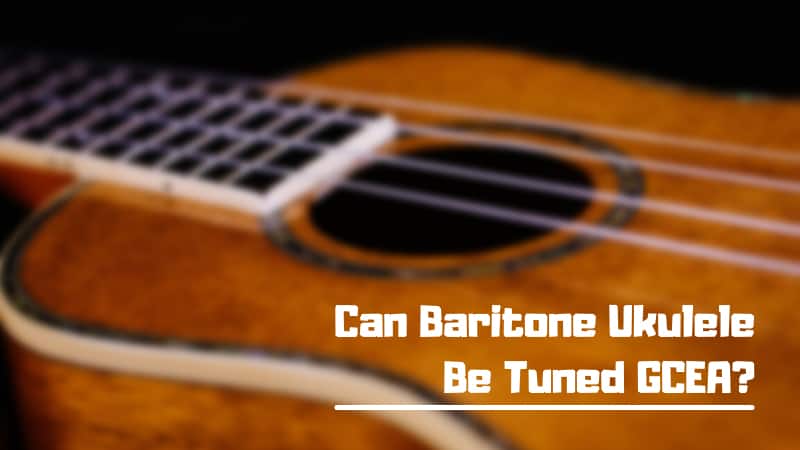A couple of nights ago, I was casually strumming on my Kala baritone ukulele, enjoying the warm resonance and the rain. Then a sudden thought came upon my mind.
Generally, baritone ukuleles are tuned at DGBE. That’s the standard baritone tuning scheme. But can baritone ukulele be tuned GCEA? I began to conduct research, gave some trial runs, and came up with the following conclusion.
You can change the tune of a baritone ukulele to GCEA by using specialized strings that are made for baritone ukuleles and tunable to GCEA or high G. You can even use high D strings and tune it up by four and a half steps as well.
Tuning a baritone ukulele into GCEA is pretty simple if you know what you’re doing. Thanks to us, you’ll have no questions regarding this topic when you’re done reading this article.
What is GCEA Tuning?
Just in case you didn’t know, GCEA tuning is the most commonly found standard ukulele tuning. As most of you already know, there are four standard sizes of ukuleles. Soprano, Concert, Tenor, and Baritone.
Among these four ukulele types, 3 of them come in G-C-E-A tuning. This is the standard tune of a typical ukulele. This tune is responsible for the harp-like soothing tone created from the ukuleles.
However, the Baritone ukulele comes at a different tune of DGBE. This is the tune of the 4 bottom strings of a guitar. Therefore, the Baritone ukulele sounds a lot like acoustic guitars. Moreover, they are also known as miniature versions of guitars.
Reasons Behind Tuning Your Baritone Ukulele to GCEA
Now that you’ve got a clear idea about the GCEA tune, let’s see why you might wanna change your baritone from DGBE to GCEA.
Blends In Easily
GCEA is known as the re-entrant tuning. When you change your tune from DGBE to GCEA, your baritone ukulele will sound just like the other types. Well, not exactly like the other types since the baritone produces a warmer tone with a louder projection.
However, with a GCEA tuning, you’ll be able to easily follow the lessons on YouTube or even play along with other people.
GCEA Works Better with A High-pitched Voice
GCEA tuning creates a significantly sharper voice compared to the standard tuning of a bari uke. If your voice is high-pitched, then the standard DGBE tune of a baritone ukulele will sound displaced. It’s much more suitable for voices that produce low pitch sounds.
Therefore, if you have a high-pitched voice, then it’s a good idea to change your baritone into GCEA tuning.
Sharper Tones
Compared to the standard baritone ukulele, the GCEA tuning is capable of producing sharper tones. Due to the size of the baritone, the uke creates a warm tone. On top of that, the D-G-B-E tuning makes it even warmer. Therefore, the baritone ukulele feels amazing to strum casually or play a simple 4 chord song – similar to an acoustic guitar.
However, if you want to produce accurate and sharp notes from each fret, you should opt for the GCEA tune.
Easier to Play the Basic Chords
The basic chords of a ukulele are different than the basic chords of a guitar. Even more so, when you possess a baritone ukulele. You have to mix the techniques from guitar chords and ukuleles in order to learn the basic chords.
However, if you choose the re-entrant tuning, it will be easier for you to follow and learn the basic chords. There are tons of sources and videos online where you can easily learn the basics. But as they follow the generic GCEA tuning, it’ll be easier if you’re willing to learn the basic chords as well as play the generic ukulele songs.
A Better Choice for Beginners
Baritone ukes are the biggest in the ukulele family and a lot of beginner musicians buy the baritone ukulele for the plus size. Baritones are basically a miniature acoustic guitar, even sounds similar. Beginners love the extra fret space and playability.
However, it turns into a problem as the tuning is a bit different than typical ukuleles. So, beginners prefer a baritone ukulele with GCEA tuning.
How to Tune a Baritone Ukulele to GCEA
We’ve provided the answer to the question ‘can baritone ukulele be tuned GCEA?’.
We’ve provided the possible reasons you might want to opt for a change in tune.
If you’re convinced, now we’re going show to you how you can tune a baritone ukulele from DGBE to GCEA.
It’s pretty easy. All you have to do is purchase a set of specialized baritone ukulele strings that are designed for higher-scale tuning. There are two ways you can approach this.
First, you can buy a high or low GCEA string set for baritone ukuleles according to your preference. Then all you have to do is just string them to your ukulele and tune accordingly. Make sure you tie up the strings properly, otherwise things can turn out to be rather ugly. For instance, if you string a C string in place of G and try to tune it – chances are you’re going to end up breaking it.
If you purchase a high GCEA set, then you’ll be able to achieve a sharp, precise tone. Whereas, if you decide to go for a low one, you’ll have a warmer tone. So, choose your string set according to your sound preference.
The other option is, you can purchase a high DGBE or high D strings and tune them four and a half steps higher. As a result, you’ll end up with a high GCEA tune. If you’re following this method, make sure to tune the string instrument properly for optimum results. Make sure you know your way around the method of tuning. If you have any trouble tuning the uke, try using a guitar tuner or get help from an expert.
Between the two, we recommend following the first method to change the tune of a baritone ukulele. However, custom GCEA strings are a bit rare to find and therefore leaves people with no alternative. High D strings are commonly available in the market.
Important Note: Make sure you buy quality strings for your instrument as low-quality strings can slowly erode the functionality of a ukulele over time.
High GCEA Strings for Baritone Ukuleles
Aquila 23U Nylgut Baritone Ukulele String Set
We are all familiar with the famous Aquila Nylgut strings. 9 out of 10 ukuleles are using an Aquila Nylgut string. The Aquila Nylgut 23U is one of the best strings out there for baritones that provide a high G tune. They are sturdy, have precise intonation, and holds pretty well in all sorts of environment.
Aquila 117U LAVA SERIES Ukulele BARITONE Strings
The Aquila Lava series was manufactured to pay homage to the Hawaiian culture – where it all started. Among them, the 117U series is crafted specifically for the baritone types. These gray-black colored exotic strings are made from their sturdy supernylgut material. In addition, the strings are marked with different colors so the user won’t make a mistake while wound strings.
Low GCEA Strings for Baritone Ukuleles
Aquila Lava Strings
Just like the previous one, the Aquila Lava series has a set of strings made for baritone ukulele and compatible with low G tuning. If you’re looking for a good set of strings to tune into low G, this is an excellent choice.
D’addario Baritone Low G Gcea Baritone Ukulele Strings Custom Set
A lot of people didn’t prefer the tone created by Aquila strings. So, we decided to follow the trial and error method and found a custom set that will be perfect for a low G tuning. The following D’addario strings are used in this custom set.
- Bronze Wound Folk Nylon Low G
- A Nylon Silverwound C String
- Pro Arte Nylon Strings for the 3rd string and 4th string (for E & A)
Combined, the strings create an amazingly warm, mellow tone that will instantly melt your heart. This custom set sounds very similar to a tenor ukulele. However, the strings a bit tighter than the regular ones. So, you’ll feel some tension on your fingers when you play.
Baritone Ukulele GCEA vs DGBE: Which Tune Is The Best
You’ve tried both of the tunes, but now unsure about which one to opt for. Then this part is for you. Among the baritone ukulele players, this is a pretty common topic for an argument. In regard to a baritone ukulele, GCEA vs DGBE creates tension between the players and we believe that it is really unnecessary.
If you prefer a warmer, mellow tone similar to an acoustic guitar, the D-G-B-E tuning can provide you exactly that. The mellow sound makes it easier to strum and play for hours.
On the other hand, if you prefer a sharper, more precise tone – then you should opt for the GCEA tune.
Additional Questions
Can you use soprano strings on a baritone ukulele?
Unfortunately, no. You have to use strings specific to baritones. Otherwise, the string can break over the nuts due to the higher tension.
Is the baritone ukulele good for beginners?
Yes, they are. Baritone ukuleles provide a larger space between the frets making it easier to play for beginners – especially ones with larger hands. As a baritone player with large hands, I can vouch for that.
Final Thoughts
A lot of musicians prefer baritone ukuleles due to their size and loud music projection. At the same time, a lot of them think that they sound awfully similar to guitars. Therefore, if you want to have a plus-size ukulele but still want the feel of a classic harp-like sound – you should consider alternate tuning such as GCEA.



